|
|
|
Sort Order |
|
|
|
Items / Page
|
|
|
|
|
|
|
| Srl | Item |
| 1 |
ID:
127619
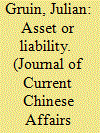

|
|
|
|
|
| Publication |
2013.
|
| Summary/Abstract |
China's financial system, dominated by the banking sector, has played a central role in the development of an imbalanced trajectory of economic development and growth. As one of the primary mechanisms for implementing decisive macro-economic policy, the banking sector has hitherto served the Chinese growth strategy well in actively allocating capital towards the investment and export sectors, whilst proving capable of managing the macro-economic ramifications of this highly inter-ventionist strategy. However, the role of the financial system in this growth strategy is also rooted in the requirement that authority over financial capital remains closely tied to state institutions and policies, due to elite concern over politico-economic instability. Based on policy analysis and qualitative interviews conducted in mid-2012, the article suggests that whilst the structure of the financial system was conducive to fostering the growth of the real economy, it will hold back not the need for rebalancing, but rather the process of rebalancing itself.
|
|
|
|
|
|
|
|
|
|
|
|
|
|
|
|
| 2 |
ID:
131397
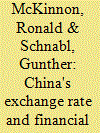

|
|
|
|
|
| Publication |
2014.
|
| Summary/Abstract |
Instability in the world dollar standard, as most recently manifested in the US Federal Reserve's near-zero interest rate policy, has caused consternation in emerging markets with naturally higher interest rates. China has been provoked into speeding RMB "internationalization"; that is, opening up domestic financial markets to reduce its dependence on the US dollar for invoicing trade and making international payments. However, despite rapid percentage growth in offshore financial markets in RMB, the Chinese authorities are essentially trapped into maintaining exchange controls (reinforced by financial repression in domestic interest rates) to avoid an avalanche of foreign capital inflows that would threaten inflation and asset price bubbles by driving nominal interest rates on RMB assets down further. Because a floating (appreciating) exchange rate could attract even more hot money inflows, the People's Bank of China should focus on keeping the yuan/dollar rate stable so as to encourage naturally high wage increases to help balance China's international competitiveness. However, further internationalization of the RMB, as with the proposed Shanghai pilot free trade zone, is best deferred until world interest rates rise to more normal levels.
|
|
|
|
|
|
|
|
|
|
|
|
|
|
|
|
| 3 |
ID:
154451
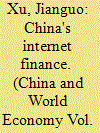

|
|
|
|
|
| Summary/Abstract |
China's Internet finance industry developed explosively from 2012 to 2015. Undersupply of financial services, progress of information technology and accommodative regulations for Internet finance jointly explain the explosive development. Regulation tightened after the small-scale P2P lending crisis in 2015. The present paper discusses the role of information technology and mega data analysis in financial services, with particular attention paid to some popular misconceptions. The paper predicts that large financial institutions and information technology companies will play a dominant role in the future development of Internet finance.
|
|
|
|
|
|
|
|
|
|
|
|
|
|
|
|
| 4 |
ID:
113007
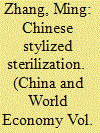

|
|
|
|
|
| Publication |
2012.
|
| Summary/Abstract |
This paper attempts to explain why sterilized intervention was so successful and sustainable in China during the first decade of the 21st century. We argue that the Chinese Government established a sterilization cost-sharing mechanism among the People's Bank of China, commercial banks and the household sector. On the one hand, Chinese commercial banks have to assume some of the sterilization costs by purchasing low yield central bank bills and maintaining high levels of required reserves. On the other hand, Chinese households assume some of the sterilization costs by bearing negative real deposit interest rates. The cost-sharing mechanism under financial repression prevents a huge quasi-fiscal loss by the People's Bank of China as well as high inflation. However, Chinese households have become victims of this financial repression. Faced with the pressure of changing the growth model from investment-driven to domestic consumption-driven, the interest rate will have to be liberalized eventually, which will, in turn, make sterilized intervention unsustainable.
|
|
|
|
|
|
|
|
|
|
|
|
|
|
|
|
| 5 |
ID:
047211


|
|
|
|
|
| Publication |
New Delhi, Indian Council for Research on International Economic Relations, 2001.
|
| Description |
55p.
|
| Series |
I.C.R.I.E.R.Working Paper No. 71
|
|
|
|
|
|
|
|
|
|
|
|
Copies: C:1/I:0,R:0,Q:0
Circulation
| Accession# | Call# | Current Location | Status | Policy | Location |
| 044906 | 658.150954/KLE 044906 | Main | On Shelf | General | |
|
|
|
|
| 6 |
ID:
121739


|
|
|
|
|
| Publication |
2013.
|
| Summary/Abstract |
Under near-zero US interest rates, the international dollar standard malfunctions. Emerging markets with naturally higher interest rates are swamped with hot money inflows. Emerging market central banks intervene to prevent their currencies from rising precipitately. They lose monetary control and domestic prices begin inflating. Primary commodity prices rise worldwide unless interrupted by an international banking crisis. This cyclical inflation on the dollar's periphery only registers in the US core consumer price index with a long lag. The zero interest rate policy also fails to stimulate the US economy as domestic financial intermediation by banks and money market mutual funds is repressed. Because China is forced to keep its interest rates below market-clearing levels, it also suffers from financial repression, although in a form differing from that in the USA.
|
|
|
|
|
|
|
|
|
|
|
|
|
|
|
|
| 7 |
ID:
192998
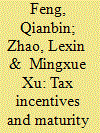

|
|
|
|
|
| Summary/Abstract |
This paper examines the effects of China's accelerated depreciation policy (ADP) on the maturity mismatch between investment and financing. Using panel data for China's A-share nonfinancial listed companies from 2010 to 2019 and a staggered difference-in-differences approach, we found the following. First, ADP significantly aggravated the degree of corporate maturity mismatch, and this result was robust across multiple checks. Second, due to an insufficient long-term loan supply, firms had to finance the fixed investments induced by ADP with short-term debts, leading to maturity mismatches. Third, the positive policy effects were mainly significant for firms with high policy exposure, high-risk preferences, a high degree of information asymmetry, and firms with weak long-term financing capacity. Finally, maturity mismatch exacerbated corporate financial risks. Our research findings indicate that passive maturity mismatch is prevalent among Chinese companies and emphasize the need to address financial repression in order to mitigate the potential financial risks that may arise from tax incentives.
|
|
|
|
|
|
|
|
|
|
|
|
|
|
|
|
| 8 |
ID:
107929
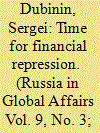

|
|
|
|
|
|
|
|